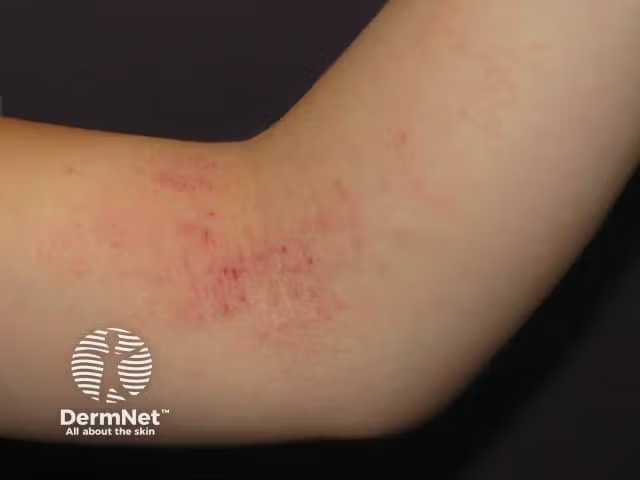- Case-Based Roundtable
- General Dermatology
- Eczema
- Chronic Hand Eczema
- Alopecia
- Aesthetics
- Vitiligo
- COVID-19
- Actinic Keratosis
- Precision Medicine and Biologics
- Rare Disease
- Wound Care
- Rosacea
- Psoriasis
- Psoriatic Arthritis
- Atopic Dermatitis
- Melasma
- NP and PA
- Skin Cancer
- Hidradenitis Suppurativa
- Drug Watch
- Pigmentary Disorders
- Acne
- Pediatric Dermatology
- Practice Management
- Prurigo Nodularis
- Buy-and-Bill
Article
Black tea dressing shows promise for facial atopic dermatitis treatment
Author(s):
Researchers treated 22 patients with facial dermatitis and noted significant decreases in disease severity in four scores assessed. According to researchers, this study offers first proof of efficacy for black tea dressing treatment.
Wet dressings with black tea could offer an effective, well-tolerated and low-cost treatment for facial atopic dermatitis, a study published in Journal of Dermatological Treatment suggests.
Several studies have reported an anti-inflammatory activity of black tea when used as a beverage, , and German dermatologists have used wet dressings with black tea to treat facial dermatitis for decades. However, there are no previous published clinical studies assessing the effectiveness of this approach, and the treatment is virtually unheard of in other parts of the world.
Researchers at the department of dermatology at the University of Lübeck, Germany, assessed the treatment in 22 patients with facial dermatitis – 18 with atopic dermatitis and four with contact dermatitis.
Non-flavored black tea, which is widely available in shops, was used to prepare wet dressings. One tea bag (approximately 2 g) was brewed for ten minutes with 200 ml of boiling tap water, and this brewed liquid discarded. More boiling water was added to the same tea bag to make another brew, which was allowed to cool to room temperature.
Gauze compresses were soaked in this second infusion, gently rung out and applied to affected areas of the patients’ faces for 20 minutes. Cold cream from German pharmacopoeia (refined peanut oil [60%], purified water [Aqua purificata, ca. 25%], cetyl palmitate 15 [8%] and yellow wax [7%]) was applied after each dressing to prevent excessive skin dryness.
This treatment was repeated five times daily for six days. Each day a new black tea infusion was made, and this infusion was used for a whole day of treatment.
A significant decrease in disease severity was observed in all four scores assessed: Facial Eczema Area and Severity Index (EASI), Visual analogue scale for pruritus, Investigator`s Global Assessment (IGA) score, and Patient’s Self-Assessment score (PAS).
The Facial EASI significantly decreased from a median of 36.75 before treatment to a median of 5.75 (p = 0.00004) on day three, and a median of 1.00 (ICR 2) on day six (p = 0.00006). There was a significant decrease in pruritus as assessed by the visual analogue scale, from a median of 4.25 before treatment to a median of 0.5 (p = 0.00006) on day three and a median of 0 (p = 0.00008) on day six.
The IGA decreased from a median of 4 before treatment to a median of 1.25 (p = 0.00004) on day three and a median of 0.5 on day six (p = 0.00006). The PSA decreased from a median of 3.5 before treatment to a median of 1 (p = 0.00009) on day three and a median of 0.5 (p = 0.00009 ) on day six.
The fall in scores was rapid and dramatic. The scores fell to 12-31% of their original values within the first three days of treatment and in eight patients all four scores fell to <25 % of their baseline value by day three of the study. These eight patients were told to reduce the frequency of black tea dressings from five to three times daily for the last three days of treatment.
Mareike Witte, of the Department of Dermatology at the University of Lübeck, Germany, said that the findings showed “that the application of black tea dressings is an easy-to-use, low-cost, and rapidly effective treatment method for facial dermatitis.”
“It provides a first formal proof of efficacy for black tea dressing treatment. In addition, it supplies dermatologists worldwide with a practical and easy-to-use protocol that can be tried in their practice.”
Although the mechanisms by which black tea dressing treatment may induce such powerful effects have not yet been studied, black tea is known to contain astringent substances (tannins) and flavonoids that both possess anti-inflammatory properties, a water-based dressing is known to reduce acute epidermal inflammation, and emollient cream following application of the wet dressing helps repair the damaged epidermal barrier and reduce inflammation.
The black tea dressing treatment was very well tolerated. There was one case of eczema herpeticum, but this was not considered a complication of black tea dressing treatment but rather of the severe atopic dermatitis.
Black tea contains a relatively high amount of nickel and therefore, nickel hypersensitivity is regarded as a contraindication to the use of black tea dressings by some German dermatologists. However, five patients in the study had a known “nickel hypersensitivity and responded in the same way as the other patients.
“While this observation needs to be confirmed on a larger number of patients, it suggests that nickel concentration in black tea is too low to impair the healing of facial dermatitis in patients with nickel allergy,” Witte says.
References:
1 Witte M, Krause L, Zillikens D, Shimanovich I. Black tea dressings - a rapidly effective treatment for facial dermatitis. J Dermatolog Treat. 2019;:1-4.
2 Aneja R, Odoms K, Denenberg AG, Wong HR. Theaflavin, a black tea extract, is a novel anti-inflammatory compound. Crit Care Med. 2004;32(10):2097-103.
3 Nag chaudhuri AK, Karmakar S, Roy D, Pal S, Pal M, Sen T. Anti-inflammatory activity of Indian black tea (Sikkim variety). Pharmacol Res. 2005;51(2):169-75.






